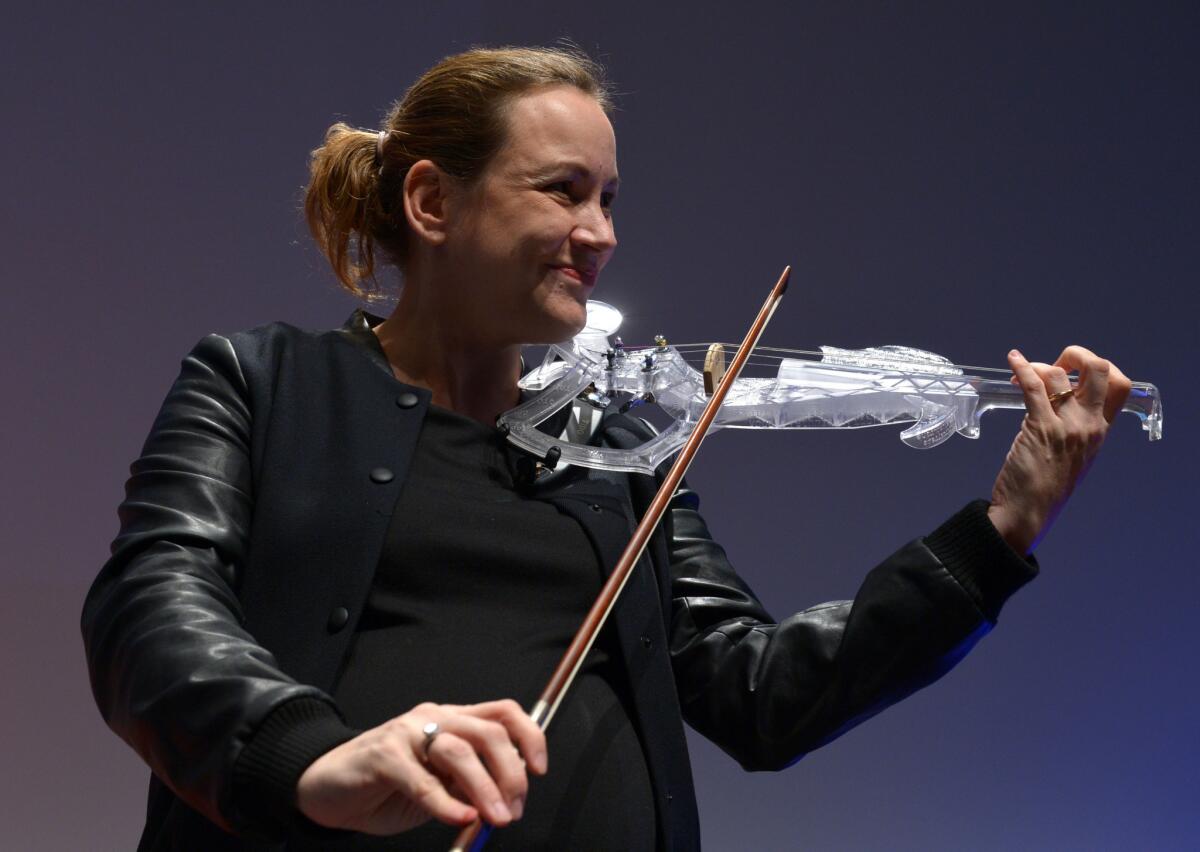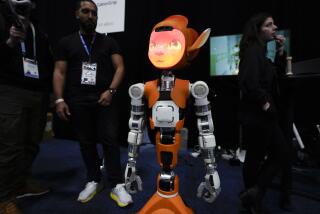Five tech categories to watch at CES

French politician Axelle Lemaire plays a 3-D-printed violin in November. The buzz, or lack thereof, around 3-D printing will be something to watch at CES.
- Share via
CES doesn’t always present a clear picture of technology trends. Longtime technology journalist Harry McCracken likened it to a circus fun house mirror, exaggerating the importance of some technologies while minimizing the potential of others.
To help cut through the noise, here are five categories we’ll be watching:
Internet of Things
More dumb devices are getting “smart” by connecting to the Internet via embedded wireless radios. And more of these connected gadgets also are bulking up on computing power so they can do more with their newfound connectivity.
Marathon Laundry, for example, has combined a washer and dryer into a single machine. Founded by former Apple executives, the Bay Area start-up’s washer/dryer combo includes a heavyweight computer processor, 10-inch HD touch screen, Wi-Fi connectivity and a gigabyte of memory.
It automatically starts loads when energy rates are cheapest. If installed in an apartment building, it allows tenants to check availability and reserve a time slot online.
Until now, many non-smartphone connected gadgets have been interesting but not necessarily essential to own. That could start to change, however, at this year’s CES, said Jeff Orr, an analyst with ABI Research.
The key will be delivering personal experiences, he said.
“I would use the example of your car,” Orr said. “To say it’s connected is a so what? What does that do?
“But what if — when you approach the vehicle — it recognizes who you are? It reconfigures the seat position, settings and content so that you have a really personalized experience. A lot of the discussion at CES will be about programs that organize information, prioritize it and make it personalized for users.”
GoPro Drone?
Drones were everywhere at CES last year. Amazon and others are planning to use them to deliver packages eventually. But for now, the most common use of quad-copters is to strap on GoPro cameras and shoot video in the sky.
GoPro has been hinting that it might get in the drone business itself with the Karma drone. It has the potential to create a lot of buzz at the show, said Scott Peterson, a digital camera analyst with Gap Intelligence.
GoPro, founded by UC San Diego alum Nick Woodman, has been battling market saturation and increased competition from rivals such as Sony and Monster — which calls its action camera “The Villain” to counter GoPro’s “Hero” line.
Still, the company holds an overwhelming market share in action cameras, despite a plethora of copycats, Peterson said.
Building a drone positions GoPro to counter efforts by some drone makers to equip their quad-copters with action cameras themselves, he said.
High-resolution audio
Digital technology has improved nearly everything it has touched, including TVs and cameras. But it hasn’t improved music.
With audio, the emphasis of digital was packing thousands of songs into your pocket. As a result, quality suffered.
But that trend is starting to reverse. High-quality headphones led the way. Now it’s expanding to music players. Sony, Neil Young’s Pono Music and others have come up with portable devices that pump out songs in high resolution. Online music stores also have popped up to sell these digitally dense recordings.
“After two generations of going down to lower-quality sound, people want higher-quality sound now,” said Gary Shapiro, head of the Consumer Technology Assn., which produces CES. “It’s bringing the studio to the listener, and it’s not just for audiophiles.”
Televisions
Big-screen TVs will no longer be the star of the show, but there will still be plenty to look at.
TV makers rolled out super-thin sets and curved screen models last year — innovating on form factor. This year, they’re getting back to picture quality.
Ultra-high definition — or 4K — has been around for a while. This year, technology will be added to 4K sets that creates better contrast between the deepest darks and the lightest lights on screen, without an overexposed look, according to San Diego market research firm Gap Intelligence.
This technology is called high dynamic range. In addition, quantum dots and similar improvements will expand the color gamut of TVs, said Paul Gagnon, an analyst with industry research firm IHS DisplaySearch.
Although there is relatively little ultra-high-definition content available today, 4K TVs still account for roughly 15% of U.S. television sales, Gagnon said.
“It is reasonable to expect there will be more 4K content three or four years from now,” he said.
TV makers could begin talking about the next picture-quality upgrade known as 8K. But analysts don’t expect to see much in the way of demonstrations — in part because 4K is still relatively new on the market.
3-D printing tipping point?
The buzz, or lack thereof, around 3-D printing will be something to watch at the show.
For the last three years, 3-D printing has been one of the most interesting new technologies at CES. And it’s hot again this year, with a 30% increase in exhibitors.
But despite the fun of printing three-dimensional objects, including electric guitar bodies and intricate candy, 3-D printing hasn’t yet hit its stride with mainstream consumers.
And it could begin to lose steam at CES compared with previous years as consumer adoption continues to be elusive, according to Gap Intelligence.
mike.freeman@sduniontribune.com
Twitter: @TechDiego






